人教版九年级全一册Unit 1 How can we become good learners?Section B (2a~2e))课件(共38张PPT,内嵌音频)
文档属性
| 名称 | 人教版九年级全一册Unit 1 How can we become good learners?Section B (2a~2e))课件(共38张PPT,内嵌音频) | 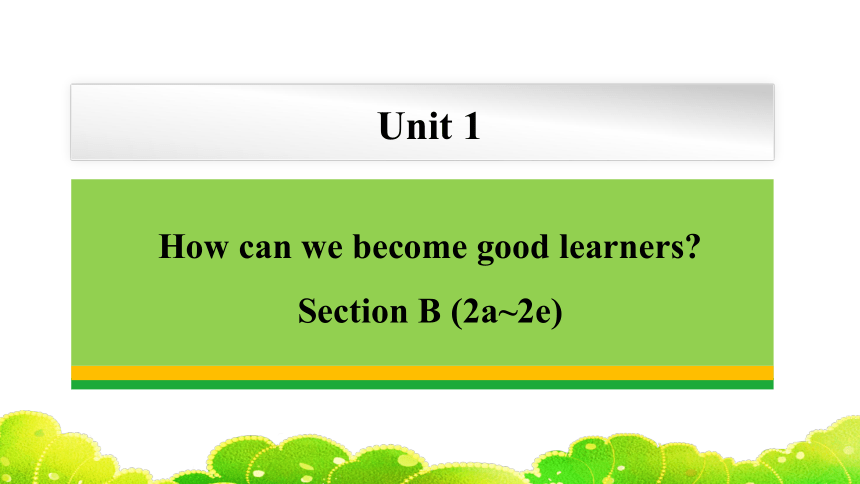 | |
| 格式 | pptx | ||
| 文件大小 | 25.5MB | ||
| 资源类型 | 教案 | ||
| 版本资源 | 人教新目标(Go for it)版 | ||
| 科目 | 英语 | ||
| 更新时间 | 2024-01-12 20:29:41 | ||
图片预览

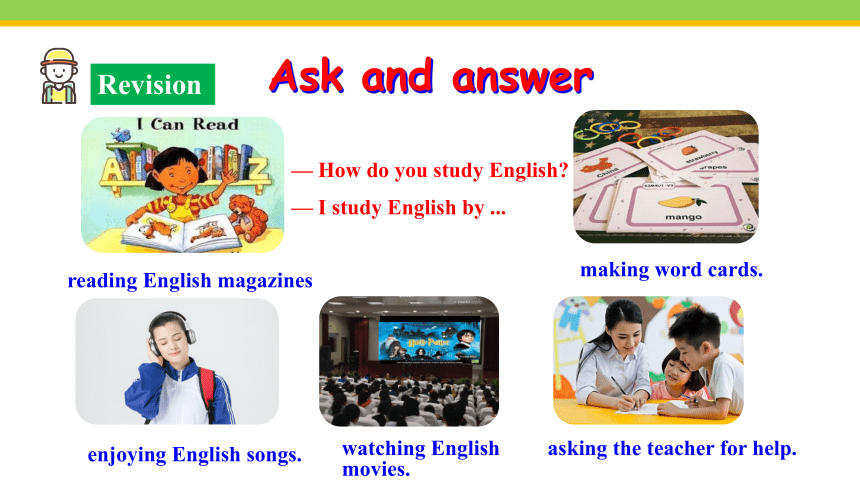
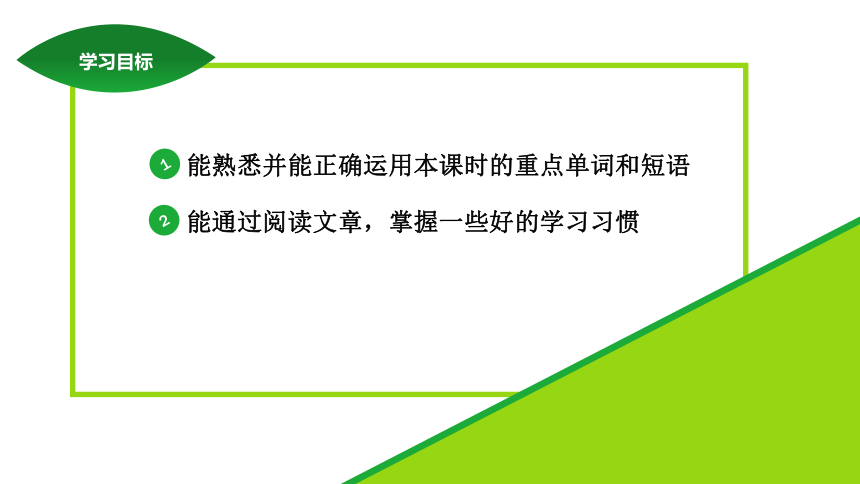

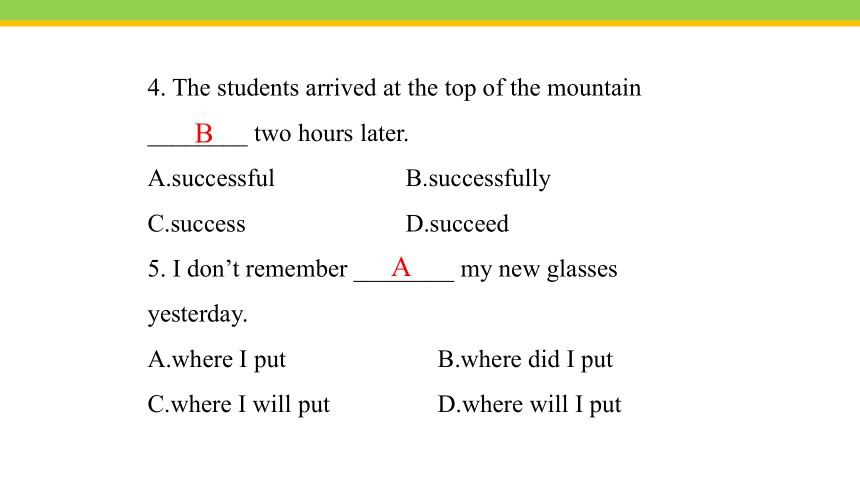
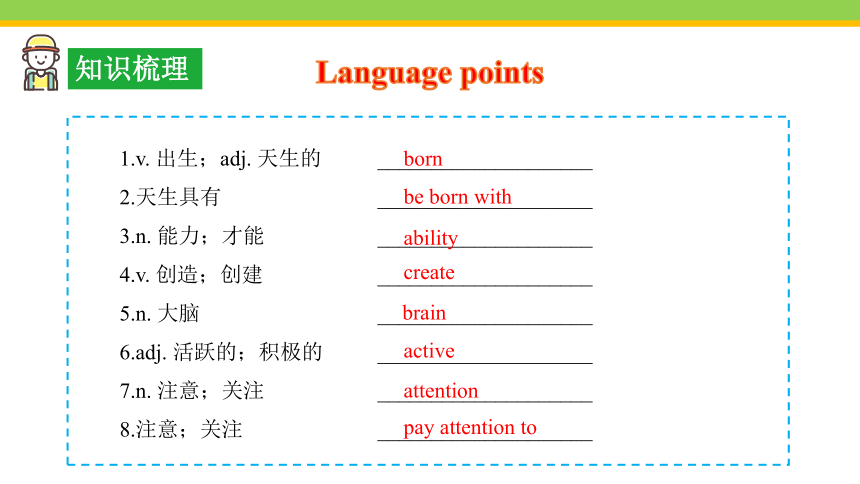
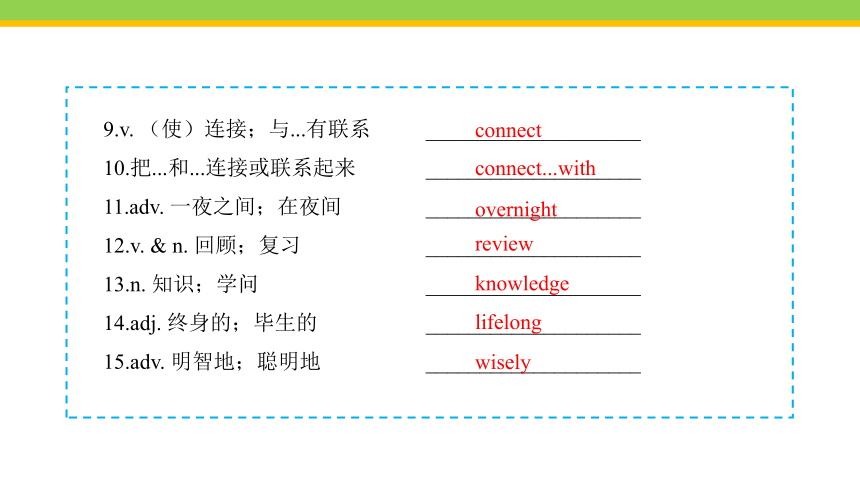
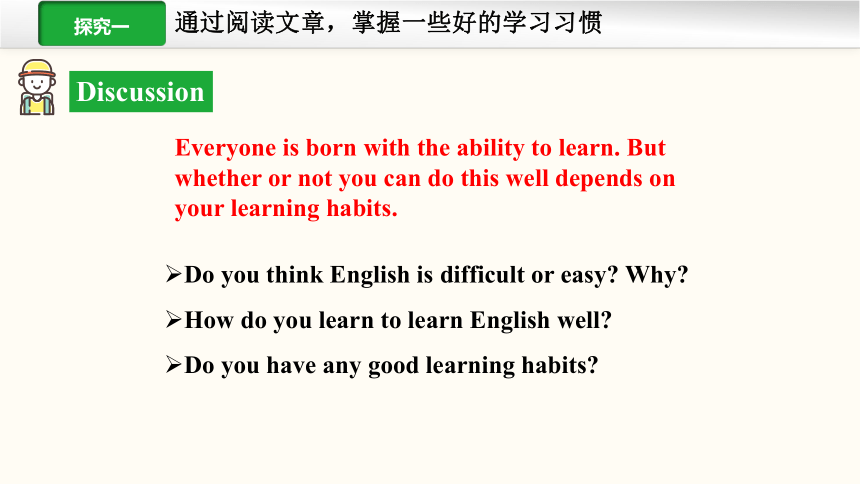
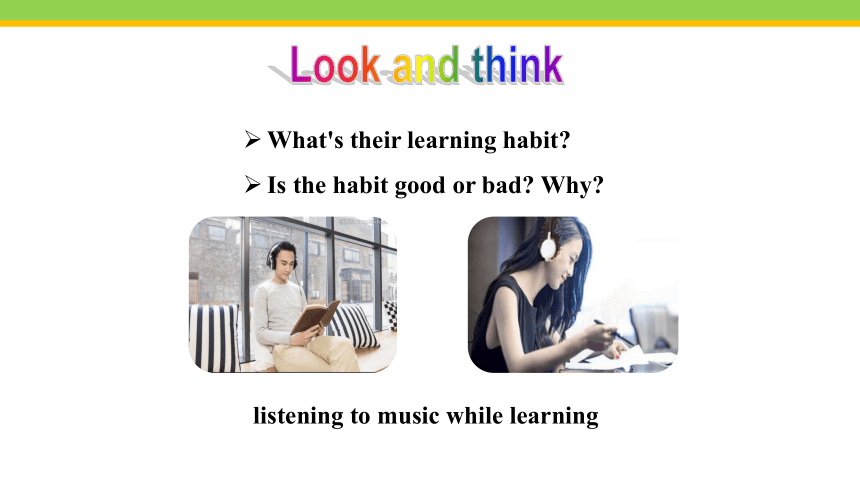
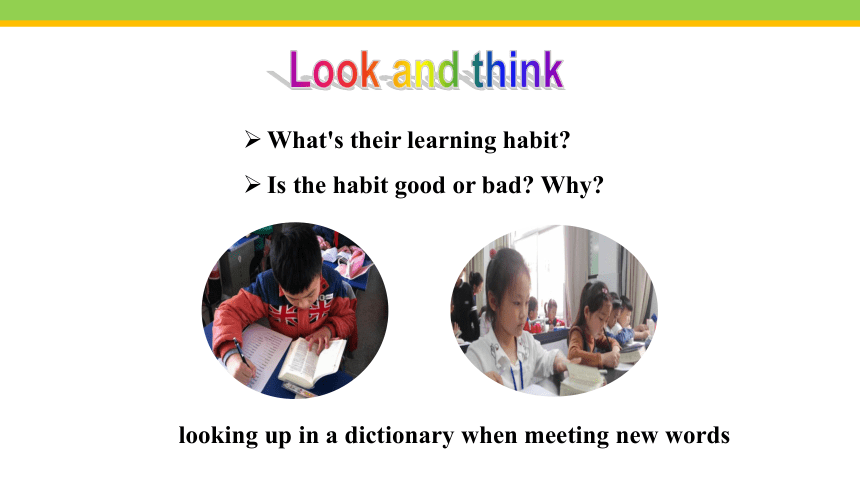
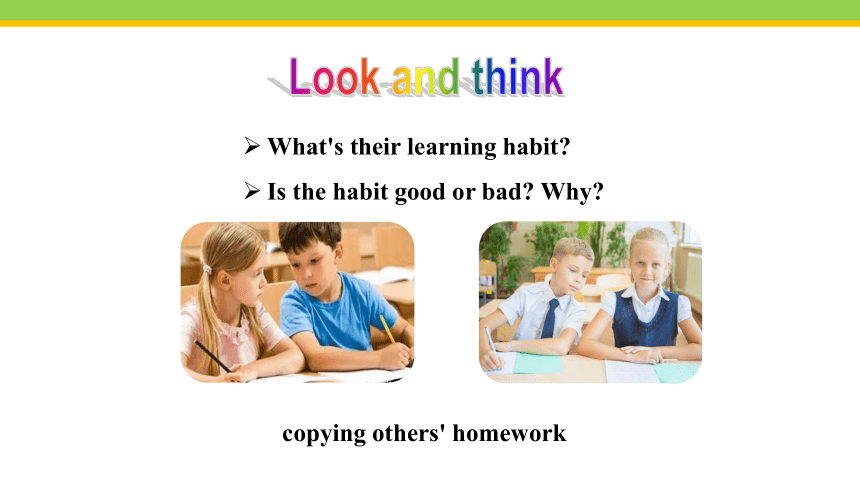
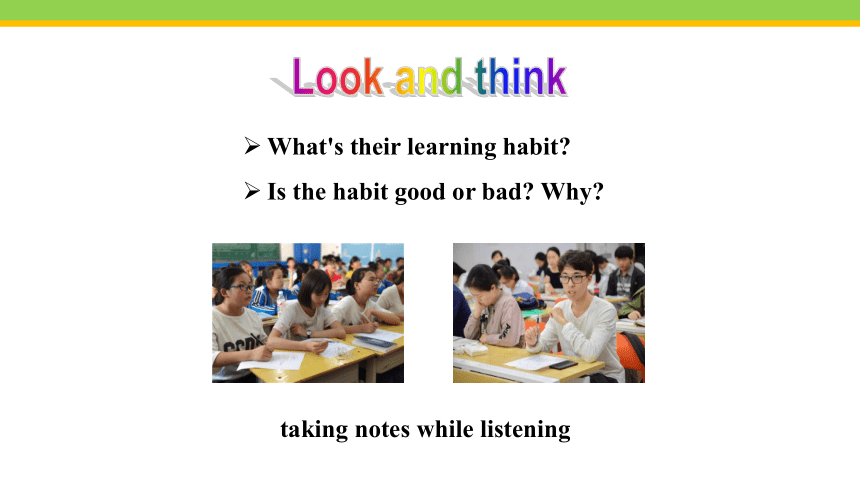
文档简介
Unit 1
How can we become good learners? Section B (2a~2e)
Revision
Ask and answer
watching English movies.
asking the teacher for help.
enjoying English songs.
reading English magazines
making word cards.
— How do you study English?
— I study English by ...
2
1
能熟悉并能正确运用本课时的重点单词和短语
能通过阅读文章,掌握一些好的学习习惯
预习检测
1. We have built bridges and tunnels to ________ the two big parts of the city.
A.admit B.connect C.pull D.realize
2. What’s your plan, Mike? Anyway, please let me know ________ you’ll leave or not.
A.that B.which C.whether D.how
3. Did you pay any attention ________ what I said?
A.on B.in C.at D.to
B
C
D
4. The students arrived at the top of the mountain ________ two hours later.
A.successful B.successfully
C.success D.succeed
5. I don’t remember ________ my new glasses yesterday.
A.where I put B.where did I put
C.where I will put D.where will I put
A
B
知识梳理
Language points
1.v. 出生;adj. 天生的 ____________________
2.天生具有 ____________________
3.n. 能力;才能 ____________________
4.v. 创造;创建 ____________________
5.n. 大脑 ____________________
6.adj. 活跃的;积极的 ____________________
7.n. 注意;关注 ____________________
8.注意;关注 ____________________
born
be born with
create
ability
brain
active
attention
pay attention to
9.v. (使)连接;与...有联系 ____________________
10.把...和...连接或联系起来 ____________________
11.adv. 一夜之间;在夜间 ____________________
12.v. & n. 回顾;复习 ____________________
13.n. 知识;学问 ____________________
14.adj. 终身的;毕生的 ____________________
15.adv. 明智地;聪明地 ____________________
connect
connect...with
review
overnight
knowledge
lifelong
wisely
Discussion
通过阅读文章,掌握一些好的学习习惯
Do you think English is difficult or easy? Why?
How do you learn to learn English well?
Do you have any good learning habits?
Everyone is born with the ability to learn. But whether or not you can do this well depends on your learning habits.
listening to music while learning
What's their learning habit?
Is the habit good or bad? Why?
Look and think
looking up in a dictionary when meeting new words
Look and think
What's their learning habit?
Is the habit good or bad? Why?
copying others' homework
Look and think
What's their learning habit?
Is the habit good or bad? Why?
taking notes while listening
Look and think
What's their learning habit?
Is the habit good or bad? Why?
asking the teacher for help
Look and think
What's their learning habit?
Is the habit good or bad? Why?
Pre-reading
2a. What good learning habits can you think of ?
Make a list and discuss them with your partner.
n. 搭档;同伴
Being attentive in class.
Having an interest in class.
Preview what you’ll learn before a lesson.
Reviewing what has learned after each lesson.
Asking questions in class.
Having a study partner.
Look at the picture and title and tell us what you think of.
Asking qestion during or after class actively
Prediction
2b. Read the passage quickly and check if any of the habits you listed in 2a are mentioned. Which four habits of successful learners can you find from the passage?
Fast reading
1. What does the passage talk about?
2. Which four habits of successful learners can you find from the passage?
The passage talks about good learning habits.
Creating an interest in what they learn;
Practicing and learning from mistakes;
Developing their study skills;
Asking questions
Careful reading
Match the detailed information with their subtitles(副标题). Write correct numbers in the blanks.
(1) Creating an interesting in what they learn
(2) Practicing and learning from mistakes
(3) Developing their study skills
(4) Asking questions
Good learners often connect what they need to learn with
something interesting. ________
Good learners know the best way they can study. _______
Good learners often ask questions during or after class. _______
Good learners will keep practicing what they have learned, and
they are not afraid of making mistakes. _______
(1)
(3)
(4)
(2)
Here are some successful learners'behaviors. Which habits do they have? Write correct numbers in the blanks.
(1) Creating an interesting in what they learn
(2) Practicing and learning from mistakes
(3) Developing their study skills
(4) Asking questions
Alexander Graham Bell did not invent the telephone over night. He succeeded by trying many times and learning from his mistakes. _______
If they need to learn English and they like music or sports, they can listen to English songs or watch sports programs in English. ______
(2)
(1)
*They may take notes by writing down key words or by drawing mind maps. *They also look for ways to review what they have learned. They may do this by reading their notes every day or by explaining the information to another student. _______
(3)
They even ask each other and try to find out the answers. _______
(4)
2d. Read the passage and find the words in 2d ,then guess the meanings of them. If necessary, look them up in the dictionary.
使用词典
这可以帮你找到与文中词的语境相匹配的定义。
{5C22544A-7EE6-4342-B048-85BDC9FD1C3A}brain n.
connect v.
overnight adv.
attention n.
review v.
knowledge n.
ability n.
active adj.
wisely adv.
USING DICTIONARY
This can help you find the definition that matches the context of the word in the text.
2. I cannot connect the two things in my mind.
3. We stayed overnight with my mother.
4. He was waving his arms to draw their attention.
5. The next day we reviewed the previous day's work.
6. They successfully communicate their knowledge to others.
7. I have confidence in the ability of the players.
8. His daughter was very active and noisy in the mornings.
9. He never behaves honestly, nor wisely.
1. A good way to train the brain is to do some math exercises
every day.
2c. Read the passage again and answer the questions.
1. Does the writer think that everyone is born with the ability
to learn well? Do you agree? Why or why not?
No, he doesn’t.
Yes, I do. Because whether or not one can learn well depends on his/her learning habits.
Read Paragraph 1 and answer the question.
2. Why is it a good idea to connect something you need to
learn with something you are interested in?
Studies show that if you are interested in something, your brain is more active and it is also easier for you to pay attention to it for a long time. You will also not get bored.
Read Paragraph 2 and answer the question.
3. What do the sayings “Use it or lose it” and “Practice makes
perfect” mean? Do you agree with them?
Use it or lose it: If you stop doing something, you will forget how to do it.
Practice makes perfect: If you do something again and again, you will become very good at it.
Yes, I do.
Read Paragraph 3 and answer the question.
4. Do good learners learn from mistakes, or are they afraid
of making mistakes?
Good learners learn from their mistakes, and they are not afraid of making mistakes.
5. What study skills does the writer talk about? Do you have
those study skills?
1. Take notes by writing down key words
2. Take notes by drawing mind maps.
3. Look for ways to review what has been learnt.
① review by reading the notes every day .
② review by explaining the information to another student.
Yes. /No.
Read Paragraph 4 and answer the question.
6. Do you agree that learning is a lifelong journey? Why or
why not?
Yes. Learning is a lifelong journey because every day brings something new.
Read Paragraph 5 and answer the question.
Consolidation
Listen and fill in the blanks.
Some good learning habits from successful learners
________ an interest
in what they learn
They often _______ what they need to learn with something interesting. This way they will not get _______.
Practicing and learning
from mistakes
Practice makes _______. They _____ practicing what they have learned. They are not ______ of making mistakes, and they learn from their mistakes.
___________ their
study skills
They have the best way to study, such as taking _____ and looking for ways to
_______ .
Asking questions
__________ comes from questioning. They often ask questions ________
or after class.
bored
keep
Developing
notes
during
Creating
connect
afraid
perfect
review
Knowledge
Everyone is born with the ______ to learn. But _______ or not you can do this well depends on your learing habits. Research shows that successful learners have some good habits in _________.
ability
whether
common
Learning is a lifelong _________ because every day brings something new. Everything that you learn becomes a part of you and _______ you, so learn
______ and learn well.
journey
changes
wisely
Group work
2e. Do you think you are a good learner? What learning habits do you think are useful? Discuss with your group and share your ideas with the class.
Some sentence for giving opinions:
I think…
I feel…
I believe…
It is important to…
活动小结
通过以上活动,我们知道成功的学习者有以下一些好的学习习惯:
1. ____________________________________
2. ____________________________________
3. ____________________________________
4. ____________________________________
当堂检测见DCF课件
Creating an interest in what they learn.
Practicing and learning from mistakes.
Developing their study skills.
Asking questions.
重点单词和短语
Good learners often connect what they need to learn with something interesting.好的学习者常常把他们需要学的与一些有趣的东西联系起来。 connect作动词,意为“连接;联系”。1.connect with sb.意为“与某人取得联系”。例如:We should try to connect with them as soon as possible.
我们应该设法与他们尽快取得联系。2.connect...with...意为“把……与……连起来”。例如:A good student must connect what he reads with what he sees around him.
一个好学生必须把他所读的东西与他在周围所看到的事物联系起来。
...your brain is more active and it is also easier for you to pay attention to it for a long time.……你的大脑更活跃,并且长时间专注对你来说也是更容易的。
pay attention to意为“对……注意;留心”。
to为介词,后接名词或v.-ing形式。
类似的结构还有: look forward to doing sth. 期待做某事
be used to doing sth. 习惯于做某事
hold on to doing sth.坚持做某事
get down to doing sth. 开始做某事
But whether or not you can do this well depends on your learning habits.
但是你能否做好取决于你的学习习惯。 1.''whether or not you can do this well''在句中充当主语从句。例如:What you said is good for us.
您说的话对我们是有益的。(主语从句) 2.whether or not相当于whether,可引导从句。例如:Whether or not he can help us is still a problem.
他能否帮助我们还是个问题。
3.depend on意为“依靠,依赖;取决于”。例如:In life, children have to depend on their parents. But in school, they must depend on themselves.
在生活中,孩子们不得不依靠父母。但是在学校,他们必须依靠自己。Good grades always depend on how you study.
好成绩总是取决于你怎样学。
根据要求完成下列句子。
1.We don’t know if his idea works.(改为同义句)We don’t know _______ his idea works _______ _______. 2.你的成功取决于你学习努力的程度。(根据汉语提示完成句子)You success _______ _______ how hard you work at your lessons.
whether or not
depends on
做一做
易错辨析
succeed, success, successful与successfully
succeed 动词,后接介词in。例如:He succeeded in passing the exam. 他成功地通过了考试。success 名词例如:Thanks to Mary, we got such a great success.
幸亏玛丽,我们取得了如此大的成功。successful 形容词例如:This film is successful, many people like it.
这个电影是成功的,许多人喜欢它。successfully副词例如:We finished it successfully. 我们成功地完成了它。
根据汉语提示完成下列句子,每空一词。
1.我衷心祝愿你们能成功通过这次考试!I sincerely hope that you can ________ ________ passing this exam. 2.昨天的晚会很成功。Yesterday’s party was a ________ ________.=Yesterday’s party was very ___________.
succeed in
big success
successful
做一做
活动小结
通过以上活动,我们学习了一些重点单词和短语:
connect作动词,意为“___________”; connect with sb.意为“________________”;connect...with...意为“_____________________”。
pay attention to意为“_____________; _______”。
depend on意为“___________;________”。
还辨析了succeed, success, successful与successfully,其中succeed 为___词,后接介词in; success 为_____词;successful 为_______;successfully为
____词。
当堂检测见DCF课件
连接;联系
与某人取得联系
把……与……连起来
对……注意
留心
依靠,依赖
取决于
动
名
形容词
副
当堂检测
根据中文提示完成句子。(每空一词)
1.?我们不确定下周是否去宿营,这取决于天气情况。
We're not sure if we'll go camping next week. It ________ ________
the weather.
2.?明天上午苏珊将和我们分享她的学习习惯。
Susan will share her ________ ________ with us tomorrow morning.
3.?昨天卡萝尔要求给她时间考虑一下那件事。
Yesterday Carol asked for time to ________ ________ it.
4.?劳拉天生具有跳舞的能力。
Laura ________ ________ ________ the ability to dance.
depends on
learning habits
think about
was born with
课堂总结
Unit 1
Section B (2a~2e)
connect作动词,意为“___________”; connect with sb.意为“________________”;connect...with...意为“_____________________”。
pay attention to意为“_____________; _______”。
depend on意为“___________;________”。
还辨析了succeed, success, successful与successfully,其中succeed 为___词,后接介词in; success 为_____词;successful 为_______;successfully为____词。
Good Learning Habits:
__________________________________
__________________________________
__________________________________
__________________________________
Creating an interest in what they learn.
Practicing and learning from mistakes.
Developing their study skills.
Asking questions.
连接;联系
与某人取得联系
把……与……连起来
对……注意
留心
依靠,依赖
取决于
动
名
形容词
副
How can we become good learners? Section B (2a~2e)
Revision
Ask and answer
watching English movies.
asking the teacher for help.
enjoying English songs.
reading English magazines
making word cards.
— How do you study English?
— I study English by ...
2
1
能熟悉并能正确运用本课时的重点单词和短语
能通过阅读文章,掌握一些好的学习习惯
预习检测
1. We have built bridges and tunnels to ________ the two big parts of the city.
A.admit B.connect C.pull D.realize
2. What’s your plan, Mike? Anyway, please let me know ________ you’ll leave or not.
A.that B.which C.whether D.how
3. Did you pay any attention ________ what I said?
A.on B.in C.at D.to
B
C
D
4. The students arrived at the top of the mountain ________ two hours later.
A.successful B.successfully
C.success D.succeed
5. I don’t remember ________ my new glasses yesterday.
A.where I put B.where did I put
C.where I will put D.where will I put
A
B
知识梳理
Language points
1.v. 出生;adj. 天生的 ____________________
2.天生具有 ____________________
3.n. 能力;才能 ____________________
4.v. 创造;创建 ____________________
5.n. 大脑 ____________________
6.adj. 活跃的;积极的 ____________________
7.n. 注意;关注 ____________________
8.注意;关注 ____________________
born
be born with
create
ability
brain
active
attention
pay attention to
9.v. (使)连接;与...有联系 ____________________
10.把...和...连接或联系起来 ____________________
11.adv. 一夜之间;在夜间 ____________________
12.v. & n. 回顾;复习 ____________________
13.n. 知识;学问 ____________________
14.adj. 终身的;毕生的 ____________________
15.adv. 明智地;聪明地 ____________________
connect
connect...with
review
overnight
knowledge
lifelong
wisely
Discussion
通过阅读文章,掌握一些好的学习习惯
Do you think English is difficult or easy? Why?
How do you learn to learn English well?
Do you have any good learning habits?
Everyone is born with the ability to learn. But whether or not you can do this well depends on your learning habits.
listening to music while learning
What's their learning habit?
Is the habit good or bad? Why?
Look and think
looking up in a dictionary when meeting new words
Look and think
What's their learning habit?
Is the habit good or bad? Why?
copying others' homework
Look and think
What's their learning habit?
Is the habit good or bad? Why?
taking notes while listening
Look and think
What's their learning habit?
Is the habit good or bad? Why?
asking the teacher for help
Look and think
What's their learning habit?
Is the habit good or bad? Why?
Pre-reading
2a. What good learning habits can you think of ?
Make a list and discuss them with your partner.
n. 搭档;同伴
Being attentive in class.
Having an interest in class.
Preview what you’ll learn before a lesson.
Reviewing what has learned after each lesson.
Asking questions in class.
Having a study partner.
Look at the picture and title and tell us what you think of.
Asking qestion during or after class actively
Prediction
2b. Read the passage quickly and check if any of the habits you listed in 2a are mentioned. Which four habits of successful learners can you find from the passage?
Fast reading
1. What does the passage talk about?
2. Which four habits of successful learners can you find from the passage?
The passage talks about good learning habits.
Creating an interest in what they learn;
Practicing and learning from mistakes;
Developing their study skills;
Asking questions
Careful reading
Match the detailed information with their subtitles(副标题). Write correct numbers in the blanks.
(1) Creating an interesting in what they learn
(2) Practicing and learning from mistakes
(3) Developing their study skills
(4) Asking questions
Good learners often connect what they need to learn with
something interesting. ________
Good learners know the best way they can study. _______
Good learners often ask questions during or after class. _______
Good learners will keep practicing what they have learned, and
they are not afraid of making mistakes. _______
(1)
(3)
(4)
(2)
Here are some successful learners'behaviors. Which habits do they have? Write correct numbers in the blanks.
(1) Creating an interesting in what they learn
(2) Practicing and learning from mistakes
(3) Developing their study skills
(4) Asking questions
Alexander Graham Bell did not invent the telephone over night. He succeeded by trying many times and learning from his mistakes. _______
If they need to learn English and they like music or sports, they can listen to English songs or watch sports programs in English. ______
(2)
(1)
*They may take notes by writing down key words or by drawing mind maps. *They also look for ways to review what they have learned. They may do this by reading their notes every day or by explaining the information to another student. _______
(3)
They even ask each other and try to find out the answers. _______
(4)
2d. Read the passage and find the words in 2d ,then guess the meanings of them. If necessary, look them up in the dictionary.
使用词典
这可以帮你找到与文中词的语境相匹配的定义。
{5C22544A-7EE6-4342-B048-85BDC9FD1C3A}brain n.
connect v.
overnight adv.
attention n.
review v.
knowledge n.
ability n.
active adj.
wisely adv.
USING DICTIONARY
This can help you find the definition that matches the context of the word in the text.
2. I cannot connect the two things in my mind.
3. We stayed overnight with my mother.
4. He was waving his arms to draw their attention.
5. The next day we reviewed the previous day's work.
6. They successfully communicate their knowledge to others.
7. I have confidence in the ability of the players.
8. His daughter was very active and noisy in the mornings.
9. He never behaves honestly, nor wisely.
1. A good way to train the brain is to do some math exercises
every day.
2c. Read the passage again and answer the questions.
1. Does the writer think that everyone is born with the ability
to learn well? Do you agree? Why or why not?
No, he doesn’t.
Yes, I do. Because whether or not one can learn well depends on his/her learning habits.
Read Paragraph 1 and answer the question.
2. Why is it a good idea to connect something you need to
learn with something you are interested in?
Studies show that if you are interested in something, your brain is more active and it is also easier for you to pay attention to it for a long time. You will also not get bored.
Read Paragraph 2 and answer the question.
3. What do the sayings “Use it or lose it” and “Practice makes
perfect” mean? Do you agree with them?
Use it or lose it: If you stop doing something, you will forget how to do it.
Practice makes perfect: If you do something again and again, you will become very good at it.
Yes, I do.
Read Paragraph 3 and answer the question.
4. Do good learners learn from mistakes, or are they afraid
of making mistakes?
Good learners learn from their mistakes, and they are not afraid of making mistakes.
5. What study skills does the writer talk about? Do you have
those study skills?
1. Take notes by writing down key words
2. Take notes by drawing mind maps.
3. Look for ways to review what has been learnt.
① review by reading the notes every day .
② review by explaining the information to another student.
Yes. /No.
Read Paragraph 4 and answer the question.
6. Do you agree that learning is a lifelong journey? Why or
why not?
Yes. Learning is a lifelong journey because every day brings something new.
Read Paragraph 5 and answer the question.
Consolidation
Listen and fill in the blanks.
Some good learning habits from successful learners
________ an interest
in what they learn
They often _______ what they need to learn with something interesting. This way they will not get _______.
Practicing and learning
from mistakes
Practice makes _______. They _____ practicing what they have learned. They are not ______ of making mistakes, and they learn from their mistakes.
___________ their
study skills
They have the best way to study, such as taking _____ and looking for ways to
_______ .
Asking questions
__________ comes from questioning. They often ask questions ________
or after class.
bored
keep
Developing
notes
during
Creating
connect
afraid
perfect
review
Knowledge
Everyone is born with the ______ to learn. But _______ or not you can do this well depends on your learing habits. Research shows that successful learners have some good habits in _________.
ability
whether
common
Learning is a lifelong _________ because every day brings something new. Everything that you learn becomes a part of you and _______ you, so learn
______ and learn well.
journey
changes
wisely
Group work
2e. Do you think you are a good learner? What learning habits do you think are useful? Discuss with your group and share your ideas with the class.
Some sentence for giving opinions:
I think…
I feel…
I believe…
It is important to…
活动小结
通过以上活动,我们知道成功的学习者有以下一些好的学习习惯:
1. ____________________________________
2. ____________________________________
3. ____________________________________
4. ____________________________________
当堂检测见DCF课件
Creating an interest in what they learn.
Practicing and learning from mistakes.
Developing their study skills.
Asking questions.
重点单词和短语
Good learners often connect what they need to learn with something interesting.好的学习者常常把他们需要学的与一些有趣的东西联系起来。 connect作动词,意为“连接;联系”。1.connect with sb.意为“与某人取得联系”。例如:We should try to connect with them as soon as possible.
我们应该设法与他们尽快取得联系。2.connect...with...意为“把……与……连起来”。例如:A good student must connect what he reads with what he sees around him.
一个好学生必须把他所读的东西与他在周围所看到的事物联系起来。
...your brain is more active and it is also easier for you to pay attention to it for a long time.……你的大脑更活跃,并且长时间专注对你来说也是更容易的。
pay attention to意为“对……注意;留心”。
to为介词,后接名词或v.-ing形式。
类似的结构还有: look forward to doing sth. 期待做某事
be used to doing sth. 习惯于做某事
hold on to doing sth.坚持做某事
get down to doing sth. 开始做某事
But whether or not you can do this well depends on your learning habits.
但是你能否做好取决于你的学习习惯。 1.''whether or not you can do this well''在句中充当主语从句。例如:What you said is good for us.
您说的话对我们是有益的。(主语从句) 2.whether or not相当于whether,可引导从句。例如:Whether or not he can help us is still a problem.
他能否帮助我们还是个问题。
3.depend on意为“依靠,依赖;取决于”。例如:In life, children have to depend on their parents. But in school, they must depend on themselves.
在生活中,孩子们不得不依靠父母。但是在学校,他们必须依靠自己。Good grades always depend on how you study.
好成绩总是取决于你怎样学。
根据要求完成下列句子。
1.We don’t know if his idea works.(改为同义句)We don’t know _______ his idea works _______ _______. 2.你的成功取决于你学习努力的程度。(根据汉语提示完成句子)You success _______ _______ how hard you work at your lessons.
whether or not
depends on
做一做
易错辨析
succeed, success, successful与successfully
succeed 动词,后接介词in。例如:He succeeded in passing the exam. 他成功地通过了考试。success 名词例如:Thanks to Mary, we got such a great success.
幸亏玛丽,我们取得了如此大的成功。successful 形容词例如:This film is successful, many people like it.
这个电影是成功的,许多人喜欢它。successfully副词例如:We finished it successfully. 我们成功地完成了它。
根据汉语提示完成下列句子,每空一词。
1.我衷心祝愿你们能成功通过这次考试!I sincerely hope that you can ________ ________ passing this exam. 2.昨天的晚会很成功。Yesterday’s party was a ________ ________.=Yesterday’s party was very ___________.
succeed in
big success
successful
做一做
活动小结
通过以上活动,我们学习了一些重点单词和短语:
connect作动词,意为“___________”; connect with sb.意为“________________”;connect...with...意为“_____________________”。
pay attention to意为“_____________; _______”。
depend on意为“___________;________”。
还辨析了succeed, success, successful与successfully,其中succeed 为___词,后接介词in; success 为_____词;successful 为_______;successfully为
____词。
当堂检测见DCF课件
连接;联系
与某人取得联系
把……与……连起来
对……注意
留心
依靠,依赖
取决于
动
名
形容词
副
当堂检测
根据中文提示完成句子。(每空一词)
1.?我们不确定下周是否去宿营,这取决于天气情况。
We're not sure if we'll go camping next week. It ________ ________
the weather.
2.?明天上午苏珊将和我们分享她的学习习惯。
Susan will share her ________ ________ with us tomorrow morning.
3.?昨天卡萝尔要求给她时间考虑一下那件事。
Yesterday Carol asked for time to ________ ________ it.
4.?劳拉天生具有跳舞的能力。
Laura ________ ________ ________ the ability to dance.
depends on
learning habits
think about
was born with
课堂总结
Unit 1
Section B (2a~2e)
connect作动词,意为“___________”; connect with sb.意为“________________”;connect...with...意为“_____________________”。
pay attention to意为“_____________; _______”。
depend on意为“___________;________”。
还辨析了succeed, success, successful与successfully,其中succeed 为___词,后接介词in; success 为_____词;successful 为_______;successfully为____词。
Good Learning Habits:
__________________________________
__________________________________
__________________________________
__________________________________
Creating an interest in what they learn.
Practicing and learning from mistakes.
Developing their study skills.
Asking questions.
连接;联系
与某人取得联系
把……与……连起来
对……注意
留心
依靠,依赖
取决于
动
名
形容词
副
同课章节目录
- Unit 1 How can we become good learners.
- Section A
- Section B
- Unit 2 I think that mooncakes are delicious!
- Section A
- Section B
- Unit 3 Could you please tell me where the restroom
- Section A
- Section B
- Unit 4 I used to be afraid of the dark.
- Section A
- Section B
- Unit 5 What are the shirts made of?
- Section A
- Section B
- Review of Units 1-5
- Unit 6 When was it invented?
- Section A
- Section B
- Unit 7 Teenagers should be allowed to choose their
- Section A
- Section B
- Unit 8 It must belong to Carla.
- Section A
- Section B
- Unit 9 I like music that I can dance to.
- Section A
- Section B
- Unit 10 You're supposed to shake hands.
- Section A
- Section B
- Review of Units 6-10
- Unit 11 Sad movies make me cry.
- Section A
- Section B
- Unit 12 Life is full of the unexpected
- Section A
- Section B
- Unit 13 We're trying to save the earth!
- Section A
- Section B
- Unit 14 I remember meeting all of you in Grade 7.
- Section A
- Section B
- Review of Units 11-14
